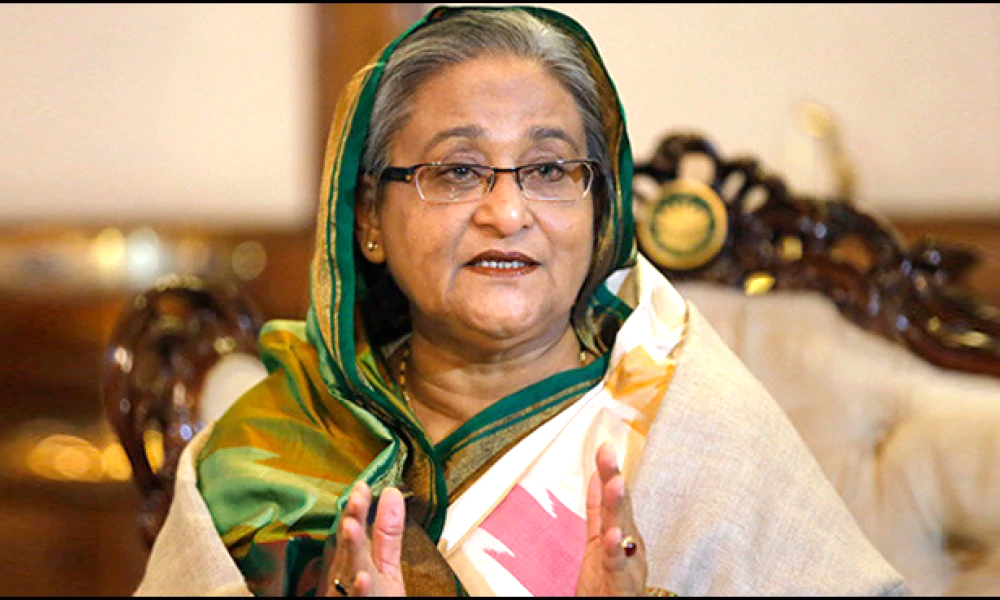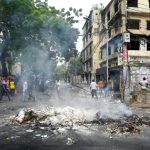Bangladesh’s Sheikh Hasina has stepped down from the post of Prime Minister in the face of mass protests demanding her resignation.
Bangladesh Army chief Waker-Uz-Zaman confirmed that Prime Minister Sheikh Hasina has resigned from her post and fled the country.
Bangladesh Army Chief Wakar uz Zaman held a press conference and said that the Army would decide the future matters of the country and the Army would hold talks with the political parties to form an interim government in the wake of Sheikh Hasina Wazed’s resignation confirmation news
Addressing the nation the national turmoil, Zaman requested the students to stay calm and go back home.
The Army chief also upged the citizen to stop violance and said that there is no need for curfew or any emergency in the country.
Earlier reports had said that the prime minister had left the capital Dhaka, a source close to the embattled leader told on Monday.
“She and her sister have left Ganabhaban (the premier’s official residence) for a safer place,” the source told. “She wanted to record a speech. But she could not get an opportunity to do that.”
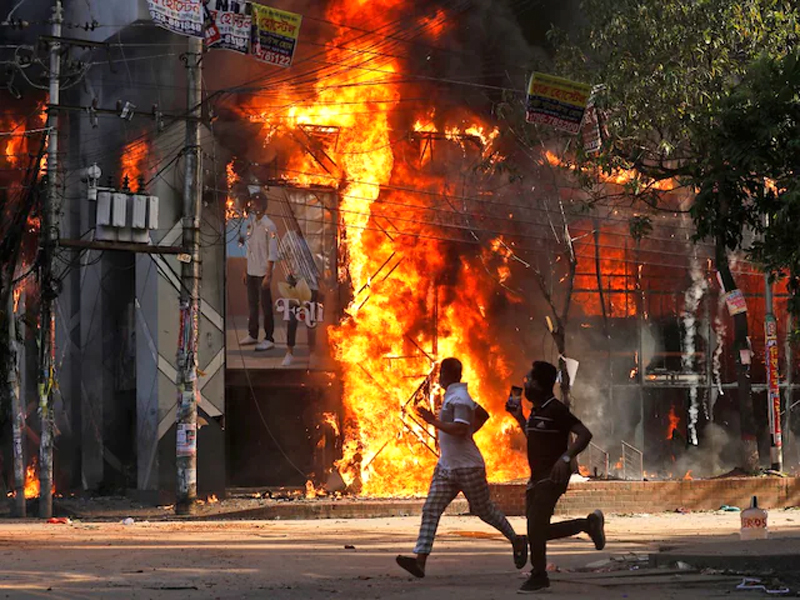
The development was followed by Bangladesh’s army chief Waker-Uz-Zaman address the nation during which he announced that the deaths during the anti-government protest would be investigated.
The army chief added that an interim government would be formed in the country and that talks in this regard were under way.
Thousands of Bangladeshi protesters defied curfew and stormed the Prime Minister’s palace in capital Dhaka after reports surfaced that Sheikh Hasina has resigned and left the country.
Jubilant looking crowds waved flags on the streets of Dhaka, before hundreds broke through the gates of Sheikh Hasina’s official residence.
The crowd also vandalised Ms Hasina’s father and former Bangladesh President Sheikh Mujibur Rahman statue in Dhaka.
Soldiers and police with armoured vehicles in Dhaka had barricaded routes to Ms Hasina’s office with barbed wire, but vast crowds flooded the streets, tearing down barriers.
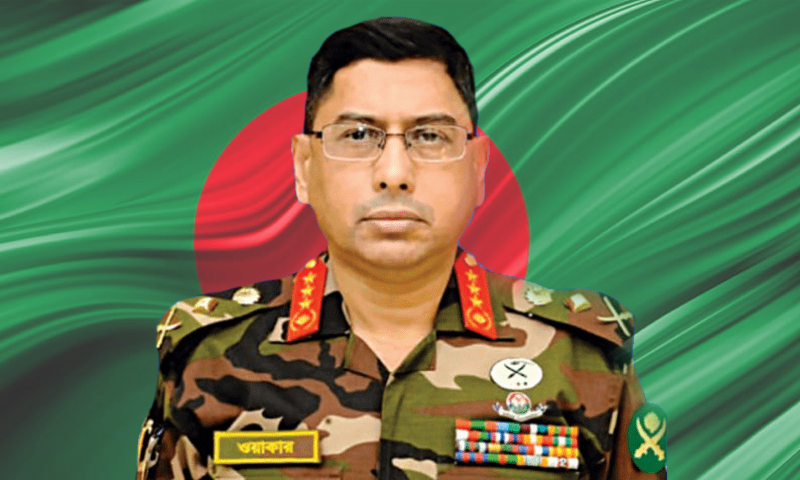
Local media estimated as many as 400,000 protesters were on the streets
Meanwhilem, Indian media claimed Hasina had left Bangladesh by military helicopter, reportedly bound for India after the protestors stormed the Prime Minister’s House in Dhaka.
Bangladeshi student leaders on Saturday said they would carry on a planned nationwide civil disobedience campaign until Prime Minister Sheikh Hasina resigned following last month’s deadly police crackdown on protesters.
Rallies against civil service job quotas sparked days of mayhem in July that killed more than 200 people in some of the worst unrest of Hasina’s 15-year tenure.
Troop deployments briefly restored order but crowds returned to the streets in huge numbers this week ahead of an all-out non-cooperation movement aimed at paralysing the government planned to begin on Sunday.
Students Against Discrimination, the group responsible for organising the initial protests, rebuffed an offer of talks with Hasina earlier in the day before announcing their campaign would continue until the premier and her government step down.
“She must resign and she must face trial,” Nahid Islam, the group’s leader, told a crowd of thousands at a monument to national heroes in the capital Dhaka to roars of approval.
Students Against Discrimination have asked their compatriots to cease paying taxes and utility bills from Sunday to pile pressure on the government.
They have also asked government workers and labourers in the country’s economically vital garment factories to strike.
“She must go because we don’t need this authoritarian government,” Nijhum Yasmin, told from one of many protests staged around Dhaka on Saturday.
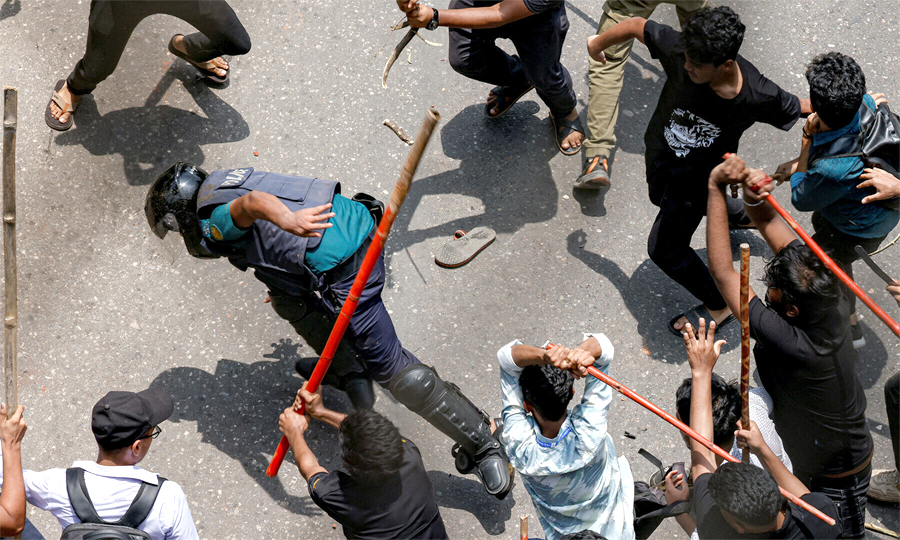
“Did we liberate the country to see our brothers and sisters shot dead by this regime?”
Protesters argue that this system is discriminatory and favours supporters of Prime Minister Hasina’s Awami League party. They advocate for a merit-based system to replace the existing quota.
The quota system, established in 1972 and briefly abolished in 2018 before being reinstated, has been a persistent source of contention. Critics claim it unfairly benefits Awami League supporters and limits opportunities for other qualified candidates. Prime Minister Hasina’s public remarks further inflamed the situation, leading to intensified protests.
The protests have evolved beyond the quota issue into a broader anti-government movement, drawing support from diverse sections of society, including film stars, musicians, and even garment manufacturers. Rap songs and social media campaigns have amplified the calls for Hasina’s resignation.
Prime Minister Hasina, who has ruled since 2009 and secured a fourth consecutive term in January through elections boycotted by the main opposition Bangladesh Nationalist Party, faces accusations of entrenching power through state institutions and suppressing dissent. The recent violence highlights the growing dissatisfaction and demands for change among the Bangladeshi populace.


